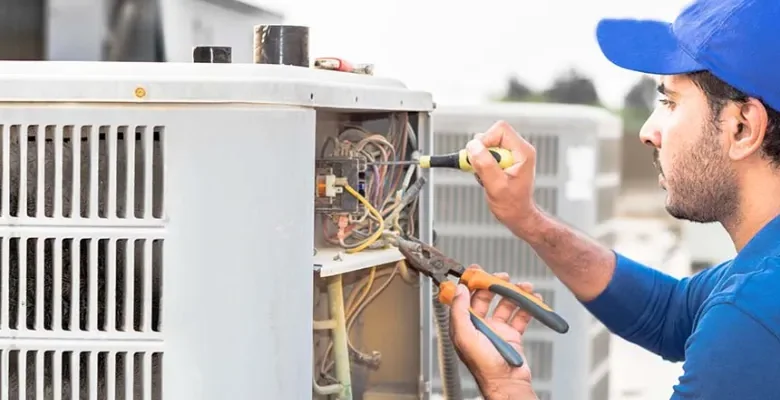All You Need to Know About Commercial HVAC in Las Vegas

In the bustling environment of Las Vegas, where extreme temperatures are the norm, having a reliable HVAC system is essential for commercial properties. The term “Commercial HVAC” encompasses the heating, ventilation, and air conditioning systems specifically designed for business settings. These systems ensure comfortable indoor climates, protect equipment, and maintain air quality. Understanding the various components and considerations of Commercial HVAC Las Vegas is crucial for business owners seeking to optimize performance and efficiency. This article delves into the fundamentals of commercial HVAC, including system types, maintenance, energy efficiency, and regulatory requirements.
Understanding Commercial HVAC Systems
Commercial HVAC systems differ significantly from residential ones, given the larger scale and varying needs of commercial buildings. Common types of commercial HVAC systems include:
- Rooftop Units (RTUs): These are self-contained systems installed on rooftops, often used for their space-saving design. RTUs can provide heating and cooling, making them ideal for various commercial settings.
- Chilled Water Systems: These systems use chilled water to cool the air in large commercial buildings. They are typically more energy-efficient and suitable for facilities requiring substantial cooling loads.
- Variable Refrigerant Flow (VRF) Systems: VRF systems allow for simultaneous heating and cooling in different zones of a building, making them highly versatile and efficient. They are ideal for buildings with varying occupancy levels.
- Split Systems: A split system consists of two main components: an indoor unit and an outdoor unit. This type is often used in smaller commercial spaces and offers flexibility in installation.
Understanding the unique characteristics of each system type helps business owners make informed decisions when selecting and installing a commercial HVAC system.
Importance of Regular Maintenance
Regular maintenance is vital for the longevity and efficiency of commercial HVAC systems. Neglecting maintenance can lead to system failures, higher energy costs, and decreased indoor air quality. Key maintenance tasks include:
- Routine Inspections: Regular inspections by qualified technicians can identify potential issues before they escalate, ensuring that the system operates efficiently.
- Filter Changes: Air filters should be checked and replaced regularly to maintain optimal airflow and indoor air quality. Clogged filters can restrict airflow, causing the system to work harder and consume more energy.
- Coil Cleaning: Both the evaporator and condenser coils should be cleaned to remove dirt and debris. Clean coils allow for better heat exchange, improving the system’s efficiency.
- Ductwork Inspection: Inspecting ductwork for leaks and blockages ensures that conditioned air is delivered efficiently throughout the building. Seal any leaks to enhance performance and reduce energy waste.
- System Calibration: Ensuring that thermostats and controls are calibrated correctly can optimize energy usage and maintain comfortable indoor conditions.
Energy Efficiency Considerations
Energy efficiency is a critical consideration for commercial HVAC systems, particularly in a climate like Las Vegas, where cooling demands are high. Implementing energy-efficient solutions can lead to significant cost savings and reduced environmental impact. Here are some strategies to enhance energy efficiency:
- Upgrading to High-Efficiency Equipment: Investing in high-efficiency HVAC units can yield substantial energy savings over time. Look for systems with a high Seasonal Energy Efficiency Ratio (SEER) and Energy Efficiency Ratio (EER) ratings.
- Utilizing Smart Thermostats: Smart thermostats can optimize heating and cooling schedules based on occupancy patterns, leading to more efficient energy usage. These devices can also provide valuable data on energy consumption.
- Regular Energy Audits: Conducting energy audits can identify inefficiencies within the HVAC system and overall building envelope. These audits can uncover areas where upgrades or adjustments are necessary to enhance efficiency.
- Implementing Zoning Systems: Zoning allows for temperature control in different areas of the building, ensuring that energy is not wasted on unoccupied spaces. This strategy is especially beneficial in larger commercial properties.
Complying with Local Regulations
Las Vegas has specific regulations governing HVAC systems that business owners must comply with. Understanding these regulations is essential to avoid penalties and ensure the system operates within legal standards. Key regulations include:
- Building Codes: Ensure that all HVAC installations meet local building codes. These codes dictate the minimum standards for energy efficiency, safety, and performance.
- Permitting: Most commercial HVAC installations require permits from local authorities. Be sure to secure the necessary permits before beginning any installation or major renovation work.
- Refrigerant Regulations: The use of refrigerants is regulated to prevent environmental harm. Ensure that your HVAC system complies with the latest EPA regulations regarding refrigerant types and handling.
- Energy Efficiency Standards: Local regulations may also impose energy efficiency standards for HVAC systems. Familiarize yourself with these requirements to ensure compliance and avoid potential fines.
The Role of Professional HVAC Services
Navigating the complexities of commercial HVAC systems is best handled by professionals. Hiring a qualified HVAC contractor is essential for installation, maintenance, and repairs. Key benefits of working with professionals include:
- Expertise and Experience: Professional HVAC contractors have the training and experience to assess the unique needs of your commercial property and recommend appropriate solutions.
- Compliance Assurance: Professional services ensure that all installations and maintenance tasks comply with local regulations and industry standards.
- Access to Advanced Technology: Contractors have access to the latest technology and equipment, allowing them to perform efficient and effective installations and repairs.
- Long-Term Cost Savings: Regular maintenance performed by professionals can extend the lifespan of the HVAC system, reducing the likelihood of costly emergency repairs.
Efficient Climate Control Solutions from Air Duct LV Heating & Cooling
Air Duct LV Heating & Cooling is the premier choice for HVAC services in Las Vegas and Henderson, committed to delivering outstanding air quality solutions. Our knowledgeable team specializes in air duct cleaning, HVAC installation, and maintenance services tailored to your specific needs. We understand the importance of a comfortable indoor environment, especially in the fluctuating desert climate. Our focus on customer satisfaction drives us to provide reliable, efficient, and effective solutions that improve the performance of your heating and cooling systems. Whether you’re experiencing an urgent issue or looking to enhance your home’s efficiency, we are here to assist. For more information about our services or to schedule an appointment, visit us at airductlv.com or call 702-670-1532. Choose Air Duct LV Heating & Cooling to ensure your home remains a sanctuary of comfort.




